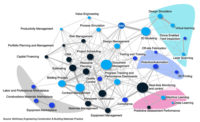Coming to America
Growing up in Bucharest, Romania, Horodniceanu went against his parents' wishes by deciding to become an engineer rather than a doctor. “Our neighbor was an engineer,” he says. “And in a communist country, he was an independent consultant.” Horodniceanu was impressed. Plus, he says, “There were already many doctors in my family. I rebelled against the norm.”
In 1961, when he was 16, his family was allowed to emigrate to Israel. Fluent in Romanian and French, he had to learn Hebrew and English. “I speak four languages, all with accents and none well.”
One of his most formative experiences was serving two and a half years in the Israeli military. “I learned what is important and what is not,” he says. “When you serve with someone in the military, you have to depend on them at some point. You have to establish a connection. [Now with clients and contractors] I try to stay in touch even after a contract is over.”
While in his 20s, he enrolled in theTechnion-Israel Institute of Technology, a notoriously rigorous school. “Out of 160 students, only 90 graduated,” he recalls. “The valedictorian scored 3.4 out of 4.0. I scored 3.0.”
His father urged him and his wife to go to America. “We thought we would earn our master's degrees and come back,” he says. “We left with two suitcases and enough money to fly back.”
He got a job with a firm called Berger-Lehman—a subsidiary of Louis Berger Group— in New York City and began working with mentor Larry Lehman. “He has told me he learned a great deal, including how to be mean when he had to be,” says Lehman. “Being mean is not easy for Michael.”
The 26-year-old Horodniceanu proved his mettle quickly, opening an upstate office for the firm. Along the way he learned the rules of diplomacy. “Once I challenged the chief engineer publicly,” he recalls. “Larry called me in.” He adds, “I'm impatient and impetuous [to this day]. It's not a good trait, but I love it when people challenge me.”
Colleagues don't fully agree with the impatience assessment, but Samuel Schwartz, former city traffic commissioner and chief engineer, notes, “We all have teams of people we rely on, and not everyone is a .300 hitter. He may get frustrated with the .250 hitters.”
Ever ready to embrace the next adventure, Horod-niceanu accepted a position to lead a program that transferred NASA technology to civilian safety systems at Brooklyn Polytechnic. The key outcome was his association with several other academics who eventually formed the firm Urbitran.












